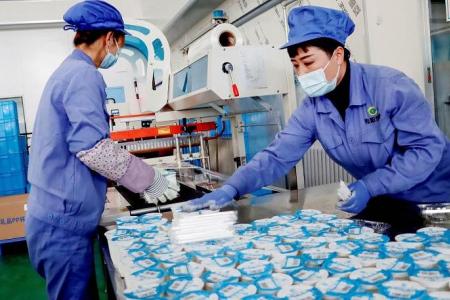Singapore to lift melamine-related requirements for importing milk products from China
Melamine-related requirements for the import of milk and milk-related products from China to Singapore will be lifted on Nov 1, said the Singapore Food Agency (SFA).
These requirements were introduced in 2008 after some 300,000 children in China were poisoned because Chinese suppliers had added melamine to powdered milk to artificially raise protein levels. Melamine is a chemical used to make plastic.
Under the requirements to be removed, products had to be made by establishments approved for export by the Chinese authorities, and manufacturers had to test each batch of both their raw materials and products to ensure that they were not contaminated with melamine.
The Chinese authorities were also required to test each batch of the products and issue health certificates with melamine test results to accompany consignments to Singapore.
Responding to queries from The Straits Times, SFA said on Thursday that it will be lifting these requirements as melamine contamination has not been detected in milk and milk products from China since 2012.
It did not elaborate on why the requirements were not lifted earlier.
SFA added that it has been closely monitoring milk and milk-related products imported from China.
“Since 2008, the Chinese authorities have also put in place enhanced regulations and control measures throughout its dairy production chain,” the agency said.
In a circular to milk and milk product traders on Monday, SFA said China has strengthened its supervision and administrative processes. These include tighter production licensing, stronger inspection, detection, monitoring and evaluation, and more severe penalties for products found with melamine across the dairy food chain.
SFA told ST that import requirements are reviewed from time to time and all food imports, including milk and its related products imported from China, must still comply with the agency’s food safety requirements.
Altogether, China’s 2008 tainted milk powder scandal killed six children. Those responsible for the contamination and its concealment were executed or given lengthy prison terms.
Responding to the deadly milk scandal in September that year, the then Agri-Food and Veterinary Authority of Singapore temporarily banned the sale of China-made milk products and tested more than 3,500 milk products.
It also destroyed 16 China milk products in Singapore that were found to contain excessive levels of melamine – at more than five parts per million. Among the affected products were White Rabbit Creamy Candy and three flavours of Dutch Lady milk.
More than a decade after the scandal, China’s dairy industry continues to feel the fallout of the scandal, with Bloomberg and South China Morning Post reporting that Chinese parents still see foreign brands as more reliable than home-grown ones.
SFA said: “We will also work with the industry to ensure that milk, milk products and products containing milk imported from China continue to be safe for consumption.”
Get The New Paper on your phone with the free TNP app. Download from the Apple App Store or Google Play Store now


